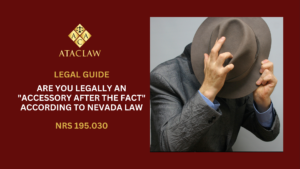Navigating through Nevada’s legal landscape, we encounter various statutes that spell out the repercussions for individuals involved in criminal activities, not as primary offenders but as those who assist after the fact. This concept may seem straightforward, but its implications are far-reaching and can drastically affect the lives of those implicated. With this in mind, ATAC LAW delves into an essential, yet often misunderstood aspect of criminal law in Nevada: What does it mean to be an “Accessory After the Fact”?

What Does It Mean to be an Accessory After the Fact?
In Nevada, being an “accessory after the fact” refers to persons who, knowing a felony has been committed, receive, relieve, comfort, or assist the felon, either to enable the felon to escape after arrest or to avoid arrest.
By aiding a felon with knowledge of their crime, you could be subjected under NRS 195.030 to punishment by law similar to those who aided and abetted the felon in the principal undertaking. Awareness about this law is crucial for everyone. It emphasizes the severity of involvement in a crime, even if you are not the primary perpetrator.
What Sets Apart Being an Accessory from Aiding and Abetting?
Aiding and abetting refers to the act of assisting a criminal in the commission of a crime during its occurrence. This means you’re actively providing some form of help while the crime is being carried out. On the other hand, becoming an accessory to a crime happens after the criminal act has concluded. If you assist a person who has already committed a crime, such as helping them hide or escape, you are considered an accessory after the fact.
It’s also important to distinguish between being an accessory and a conspirator. A conspiracy involves a plan or agreement between two or more people to commit a crime at some point in the future. So, you can engage in conspiracy without directly committing the crime yourself. Conversely, you can be labeled as an accessory even if you had no prior agreement or plan with the perpetrator; your actions following the crime are what define your role as an accessory.
In summary, the distinction between these roles boils down to the timing of your involvement and the nature of your participation with respect to the crime.
What Are the Penalties for Being an Accessory After the Fact in Nevada?
The penalties in Nevada for being charged as an accessory after the fact can range depending on the severity of the original crime.
1. If you are found guilty of being an accessory to a felony. The punishment for this can be:
a. A sentence of 1 to 5 years in the Nevada State Prison.
b. Fines that can reach up to $10,000. The exact amounts are determined on a case-by-case basis by the court.
2. If you’ve been charged for being an accessory to a gross misdemeanor, this is generally treated as a misdemeanor. The associated punishments include:
a. A jail term ranging from 30 days to 6 months in a county jail.
b. Fines that vary between $100 to $500. Just like with felonies, the exact amount is determined by the court’s discretion based on the circumstances of the case.
Implications for Immigrants
For immigrants, being convicted as an accessory could lead to severe consequences, including possible deportation. This typically depends on the specifics of the case.
How Do You Defend Against Charges of Being an Accessory?
Being charged as an accessory after the fact can be a daunting experience. But here at ATAC Law, we’ve paved the way towards successful outcomes for many individuals facing such accusations, right here in Nevada. We have found three common defense strategies to be especially effective:
1. Unawareness of Criminal Activity: You can only be held accountable as an accessory if you knowingly aided someone who committed a crime. If the prosecutor can’t prove that you were aware of the person’s criminal activity when you helped them, chances are high the case against you could be dropped.
2. Merely a Witness: Just because you knew a crime took place doesn’t necessarily make you an accessory. Unless it’s your legal obligation to report the crime—like a doctor suspecting child abuse—simply witnessing a crime is not illegal. Unless you purposefully acted to aid the offender escape the authorities, you shouldn’t be liable as an accessory.
3. Acting Under Duress: If you were coerced into helping a criminal due to threats of serious, imminent harm, you can typically absolve yourself of accessory liability. If we can demonstrate that you were under duress when you lent a helping hand to the criminal, the case against you should be dismissed.
Other defenses include mistaken identity or accusations based on false premises. Ultimately, the burden of proof lies with the prosecution—they must substantiate your guilt beyond a reasonable doubt. Remember, every situation is unique, which is why it’s essential to get professional legal help as soon as possible when facing such charges. ATAC Law is committed to helping you navigate these challenging circumstances.
For further legal assistance and to discuss your case with an expert, don’t hesitate to contact ATAC LAW.
